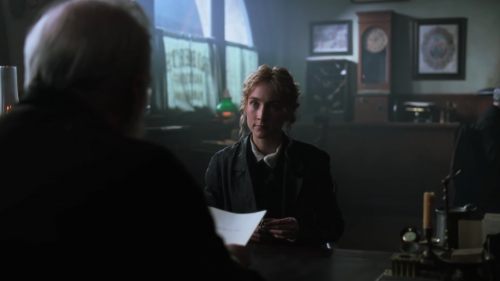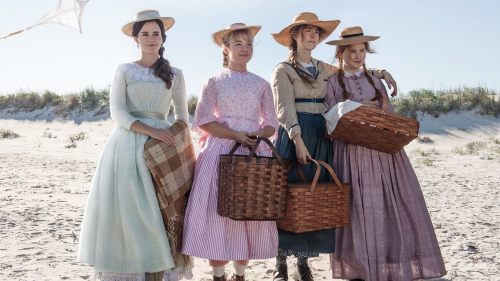LITTLE WOMEN Review: Your Story Matters
After the success of Lady Bird, it’s clear Greta Gerwig has a talent for capturing the intricacies of a young woman’s quest to find her place in the world. A gift the writer-director has now extended to her adaptation of Louisa May Alcott’s Little Women, which she lovingly begins with a title card quoting the author: “I had lots of troubles, so I write jolly tales.”
Gerwig’s deep affection for Alcott’s novel pervades the feature’s 134-minute run time, most apparent in her focus on the hopes and dreams of all four March sisters beyond how they may or may not relate to Jo (Saoirse Ronan) – but, no need to worry, the spirited writer remains the anchor of her family and the film. Adding her name to the long list of directors who have adapted the tale, from George Cukor in 1933 to Gillian Armstrong in 1994, Gerwig forges a fresh perspective on characters many of us have known since childhood, intertwining their individual experiences during and after the Civil War.
Amy, for example, the youngest of the March sisters oft portrayed as a spoiled, entitled brat, becomes – in the capable hands of Florence Pugh – an ambitious artist matching the determination and intelligence of her sister Jo before coming to terms with the fact that she doesn't quite have what it takes. In Gerwig’s version, the friction between the two headstrong sisters is born not from animosity, but from the clashing of their similar natures, making their competitive relationship a pleasure to watch as it evolves from adolescent antagonisms into a mutual respect for one another.
Likewise, while Beth’s (Eliza Scanlen) failing health limits her dreams to the simpler pleasures of home and a private passion for music, her short life is enhanced by Gerwig’s inclusion of one of the book’s more endearing sequences involving the girls’ wealthy neighbor, Mr. Laurence (Chris Cooper). Having lost his only daughter, the grieving gentleman develops a paternal friendship with the shy and fragile Beth, relishing her talent for music and offering the March family amiable company as they await their father’s (Bob Odenkirk) return from the war. Cooper and Scanlen deliver many of the film’s finest sentimental moments. Yet, even Marmee (Laura Dern) is allotted screen time beyond that of merely instructing her girls in the ways of kindness and propriety, illustrating her frustration with the state of the world through her unwavering compassion and determination to help others in need.
For Jo, Gerwig peppers her character arc with pieces of Alcott’s own life, using personal quotes from the author as dialogue in tribute to her feminism and fierce desire for independence. Ronan brings a restless fire to Jo, implying that quick temper of hers is always bubbling just beneath the surface. Still, it’s Pugh who steals the spotlight, accomplishing the impossible task of making us love and relate to the strong willed and self-confident Amy, a character who has long been overshadowed by the accomplishments of her older sister. In contrast to other adaptations, Gerwig spends an ample amount of time on the burgeoning romance between Amy and Theodore “Laurie” Laurence – played with enthusiastic wit, charm, and perfectly chiseled cheekbones by Timothée Chalamet – offering up plenty of ammo for those on Amy’s side in the endless debate over which March sister is a better match for the aimless boy next door.
Despite effortless performances from the incredible ensemble cast, Gerwig’s fast-paced, non-linear narrative may confuse those unfamiliar with certain details of the story. While previous adaptations have maintained the timeline set forth in Alcott’s novel, following the girls from their formative years into adulthood, Gerwig starts the story in the middle flashing back and forth between past and present with only hairstyles and the exquisite costumes by Jacqueline Durran offering any visual cues. In theory, Gerwig’s decision to divide the narrative this way may have seemed like a stroke of ingenuity, but in practice it negates the emotional impact of many of the story’s more pivotal moments (such as Laurie’s proposal), either because the outcome has been revealed before the event takes place, or because the relationships were not established enough to inspire any emotional connection.
But we label stories as timeless when their message speaks to generation after generation, and Louisa May Alcott’s Little Women continues to stand the test of time. Comparing Gerwig’s adaptation to those that precede it feels unfair, considering they've all catered to the young women of that time. Ask the women in your life what their favorite version is, and I wager you’ll get a variety of answers. And Greta Gerwig’s Little Women is now part of that conversation, imparting the core message of Alcott’s novel to yet another generation that all our dreams are valid, and every woman’s story matters.



